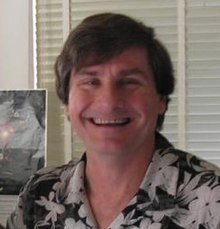Alexei Filippenko
| Alexei Filippenko | |
|---|---|
 |
|
| Born | Alexei Vladimir Filippenko July 25, 1958 Oakland, California, United States |
| Fields | Astrophysics |
| Institutions | University of California, Berkeley |
| Education |
University of California, Santa Barbara (B.A. 1979) California Institute of Technology (Ph.D. 1984) |
| Thesis | Physical conditions in low-luminosity active galactic nuclei (1984) |
| Doctoral advisor | Wallace L. W. Sargent |
| Other academic advisors | Stanton J. Peale |
| Known for | Type Ia supernova studies |
| Notable awards |
Newton Lacy Pierce Prize in Astronomy Guggenheim Fellowship |
| Spouse | Noelle Filippenko |
| Children | 4 |
|
Website astroalex |
|
Alexei Vladimir "Alex" Filippenko (/fɪlᵻˈpɛnkoʊ/; born July 25, 1958) is an American astrophysicist and professor of astronomy at the University of California, Berkeley. Filippenko graduated from Dos Pueblos High School in Goleta, California. He received a Bachelor of Arts in physics from the University of California, Santa Barbara in 1979 and a Ph.D. in astronomy from the California Institute of Technology in 1984, where he was a Hertz Foundation Fellow. He was a Miller Fellow at UC Berkeley and was subsequently appointed to a faculty position at the same institution. He was later named a Miller Research Professor for Spring 1996 and Spring 2005. His research focuses on supernovae and active galaxies at optical, ultraviolet, and near-infrared wavelengths.
Filippenko is the only person who was a member of both the Supernova Cosmology Project and the High-z Supernova Search Team, which used observations of extragalactic supernovae to discover the accelerating universe and its implied existence of dark energy. The discovery was voted the top science breakthrough of 1998 by Science magazine and resulted in the 2011 Nobel prize for physics being awarded to the leaders of the two project teams.
...
Wikipedia
